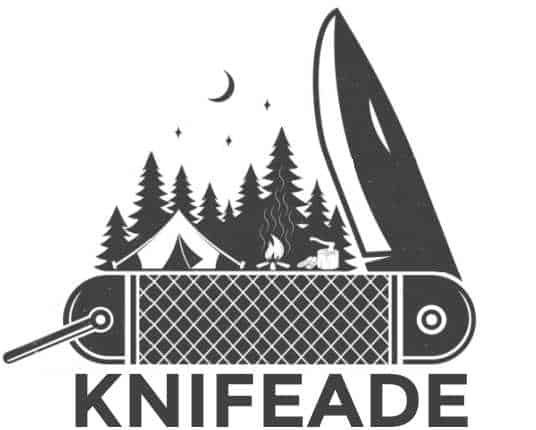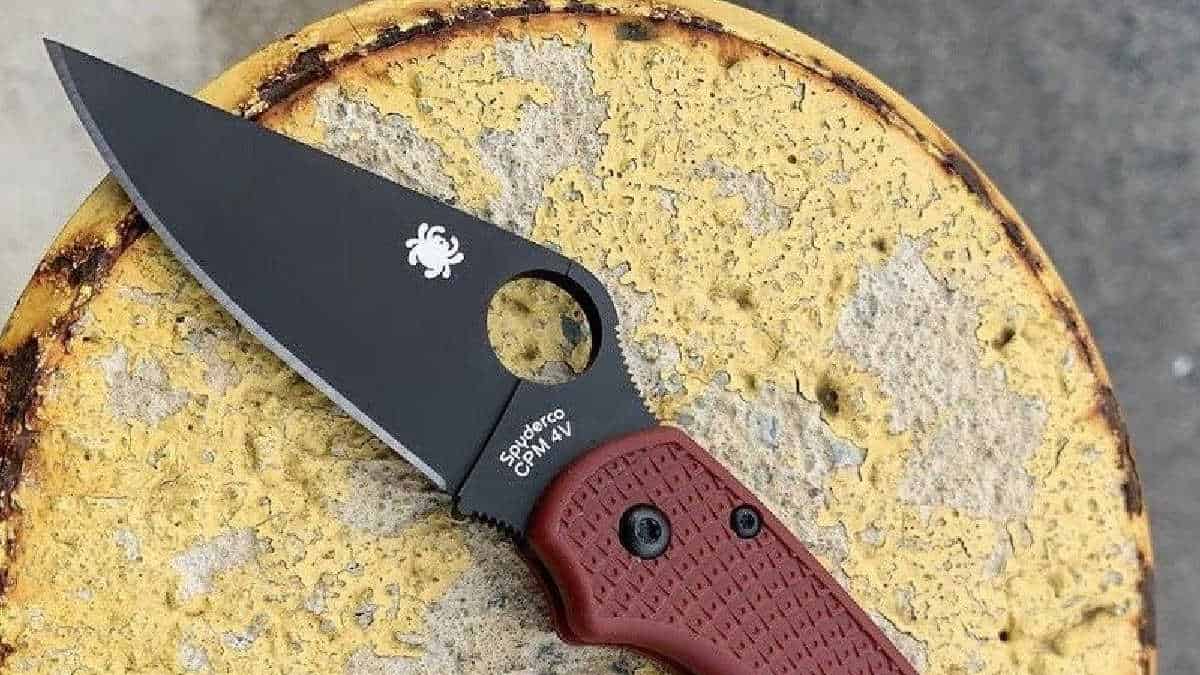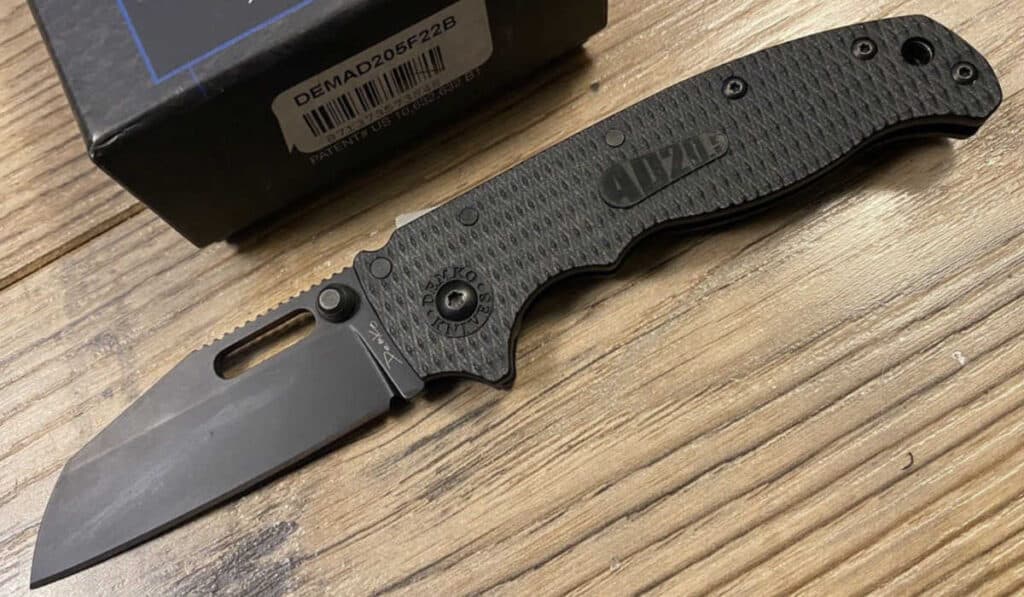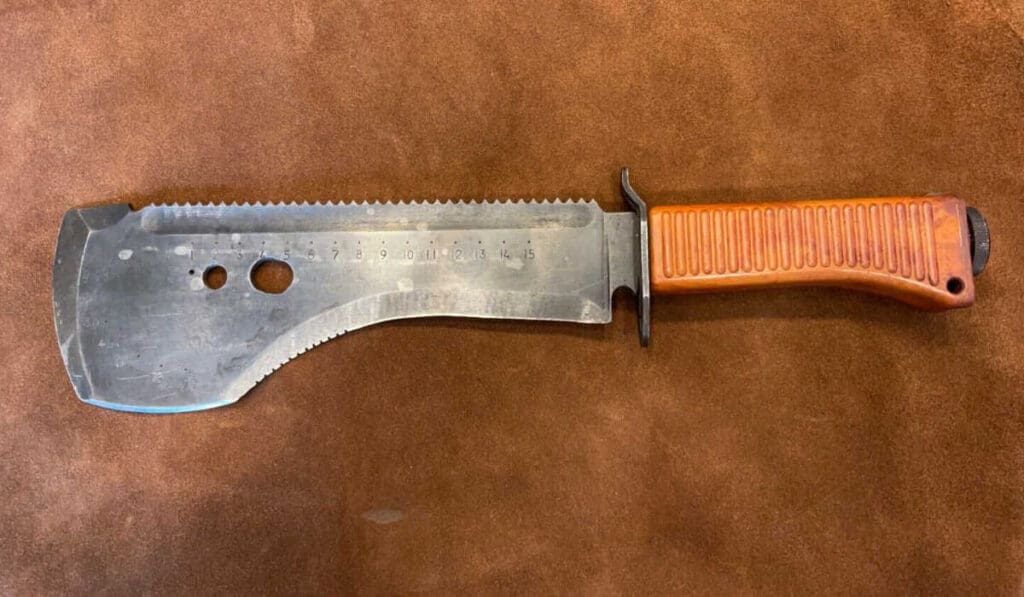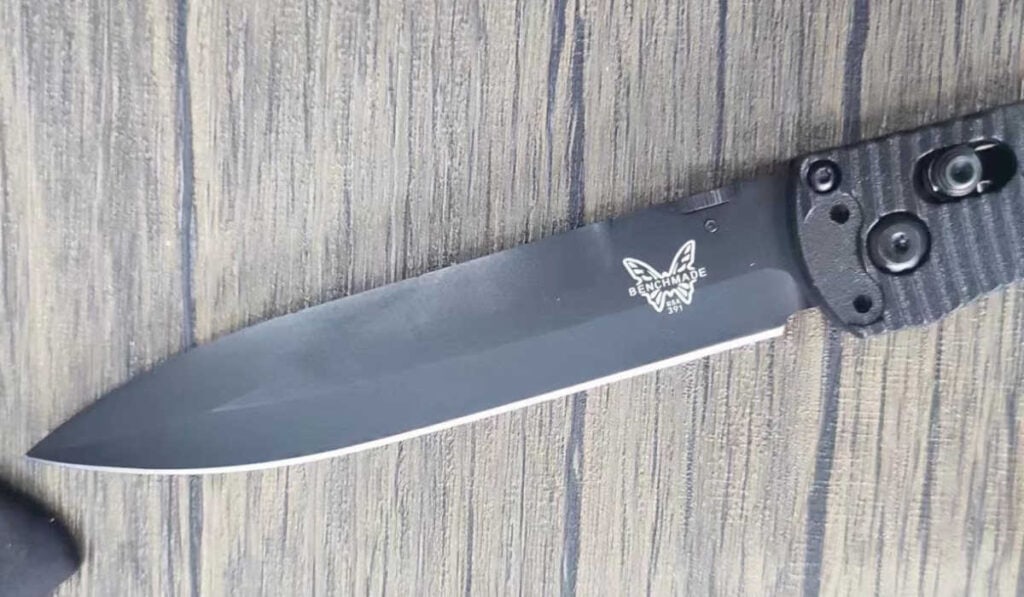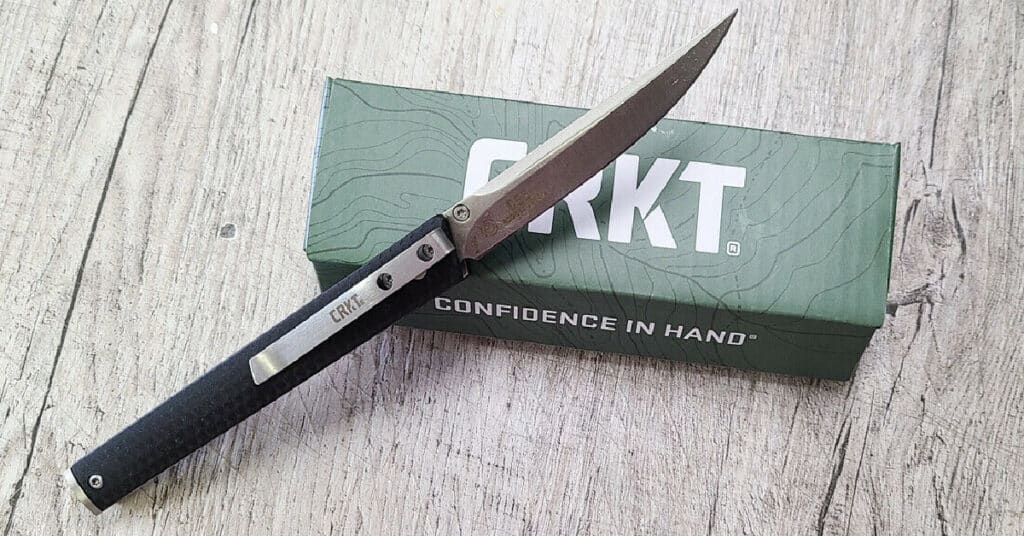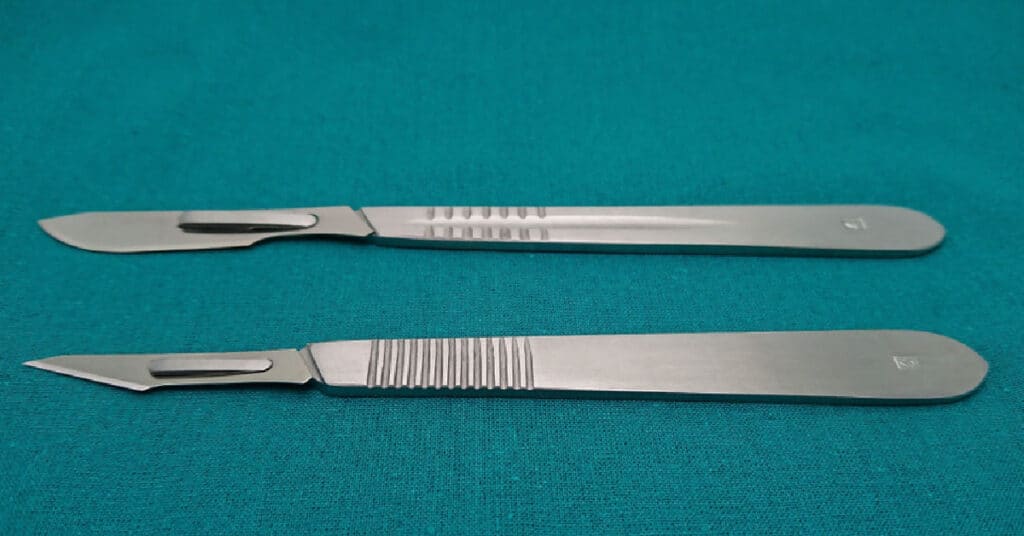Last updated on July 17th, 2023 at 08:13 pm
As an Amazon Associate I earn from qualifying purchases.
CPM-4V steel is a powder metal tool steel produced by Crucible Industries using the Crucible Particle Metallurgy process. This advanced steel type is an improvement over CPM-3V, offering higher toughness and wear resistance, although it comes with a slightly higher cost and reduced toughness compared to its predecessor. The unique combination of chemical elements in CPM-4V makes it an ideal choice for anyone seeking a durable knife with exceptional performance.
This steel exhibits outstanding performance in a variety of applications, especially those demanding extreme toughness and wear resistance. Renowned for its use in high-end fixed-blade knives, CPM-4V is a sought-after choice for both professionals and knife enthusiasts alike. Its high edge retention and moderate toughness make it a versatile option, suitable for hard-working situations where a reliable, high-quality knife is essential.
In today’s knife market, there are a plethora of steel options available, but CPM-4V stands out as a premium choice for those who demand the best balance of toughness, edge retention, and wear resistance. Its distinctive qualities make it a top contender for heavy-use knives that are built to withstand rugged environments and challenging tasks, without compromising on performance.
My Favorite Knife That Uses CPM-4V
CPM-4V Composition
CPM-4V steel is a powder metal tool steel produced by Crucible Industries using the Crucible Particle Metallurgy process. This high-performance steel is known for its impressive combination of strength, wear resistance, and toughness. In this section, we will focus on the composition of CPM-4V and its alloying elements.
Alloy Elements
The key alloying elements in CPM-4V steel are carbon, vanadium, chromium, silicon, and manganese. Each of these elements contributes specific characteristics and benefits to the steel.
- Carbon: CPM-4V has a relatively high carbon content, which ensures high hardness and strength. Carbon is an essential element for forming martensite and carbides, leading to better wear resistance and edge retention in knives.
- Vanadium: The steel’s vanadium content contributes significantly to its wear resistance. Vanadium forms hard carbides in the steel matrix, which help improve edge retention and abrasion resistance. Moreover, it refines the grain structure of steel, enhancing toughness and overall performance.
- Chromium: Chromium is responsible for the corrosion resistance in CPM-4V. Though not as high in content as stainless steels, the presence of chromium in CPM-4V adds a level of corrosion resistance that surpasses many other tool steels. This attribute makes it suitable for various outdoor and harsh environments.
- Silicon: Silicon, although present in relatively minor amounts, has a crucial role in CPM-4V steel by increasing hardenability and strength. Additionally, it aids deoxidation during the steelmaking process.
- Manganese: Manganese is another vital element in CPM-4V steel. It enhances hardenability and wear resistance by contributing to both austenite and carbide formation in the steel. The presence of manganese also helps improve the steel’s response to heat treatment.
In conclusion, the unique combination of alloy elements in CPM-4V allows it to achieve excellent balances between wear resistance, toughness, and edge retention. As a result, CPM-4V steel is popular in various tool and knife applications, especially where high performance is critical.
Properties and Performance
CPM 4V steel, produced by Crucible Industries, is a powder metal tool steel that offers a variety of properties and performance attributes for knife users. In this section, we will discuss the key characteristics of CPM 4V, including hardness and strength, toughness, wear and abrasion resistance, and corrosion resistance.
Hardness and Strength
CPM 4V steel is known for its high level of hardness and strength, making it suitable for processing high-strength, low-alloy (HSLA) steels and advanced high-strength steels (AHSS). This is primarily due to its alloying elements and the Crucible Particle Metallurgy process used in its production, allowing for higher attainable hardness compared to CPM 3V.
Toughness
While the toughness of CPM 4V is not as high as that of its predecessor, CPM 3V, it still offers a respectable level of impact resistance – an important characteristic for knives, as it helps prevent chips and breaks during use. As a result, CPM 4V remains a suitable option for applications requiring a balance between strength, wear resistance, and toughness.
Wear and Abrasion Resistance
One of the main performance attributes of CPM 4V is its excellent wear and abrasion resistance. This feature can be attributed to its composition, which includes a high percentage of vanadium, a key alloying element that contributes to a steel’s overall wear resistance. As a result, knives made from CPM 4V can maintain their cutting ability longer, even in abrasive cutting conditions.
Corrosion Resistance
While CPM 4V does not have the same level of corrosion resistance as stainless steels or some other knife steels like CPM MagnaCut, it still provides a reasonable degree of resistance against corrosion. This is due in part to the presence of chromium in its composition, which offers some protection against rust formation. As such, CPM 4V is suitable for knife users who are willing to perform regular maintenance and care for their knives to prevent corrosion issues.
Comparison with Similar Steels
CPM-4V vs 3V
CPM-4V is a high-performance tool steel alloy from Crucible, designed to offer a balance of toughness and wear resistance. In comparison to its sibling, CPM-3V, it has a higher attainable hardness and wear resistance due to its slightly different composition1. CPM-3V, on the other hand, is known for its exceptional toughness and ability to withstand extreme abuse. Both steels have a similar working hardness, but CPM-4V has a slight edge in edge retention, while CPM-3V excels in toughness.
CPM-4V vs 10V
In comparison with CPM-10V, another Crucible tool steel, CPM-4V exhibits a trade-off between different properties. CPM-10V is known for its excellent wear resistance and ability to maintain a sharp edge due to its higher vanadium content2. However, this increased wear resistance comes at the cost of decreased toughness. In contrast, CPM-4V provides a better balance between toughness and wear resistance, making it an all-around versatile choice for a variety of knife applications.
CPM-4V vs Stainless Steels
When comparing CPM-4V to popular stainless steels such as S30V, S35VN, S90V, and S110V, it is essential to consider properties like corrosion resistance, hardness, and edge retention. Stainless steels generally have better corrosion resistance than CPM-4V, which is a non-stainless tool steel. However, CPM-4V can outperform some stainless steels in terms of toughness and edge retention, specifically when comparing to S30V and S35VN. Some high-end stainless steels like S90V, S110V, and CPM-20CV have excellent edge retention and hardness but can be more challenging to sharpen and have lower toughness than CPM-4V.
In conclusion, CPM-4V is a versatile and high-performing tool steel offering a balance between wear resistance and toughness. It outperforms some other tool and stainless steels in specific areas, but its suitability depends on the intended application and user preferences.
Heat Treatment and Hardening
CPM-4V is a high-performance tool steel known for its combination of strength, wear resistance, and toughness. Proper heat treatment is crucial in achieving optimal performance for this steel. In this section, we’ll discuss the primary stages involved in heat-treating CPM-4V steel, which includes the austenitizing process, quenching process, and tempering process.
Austenitizing Process
The austenitizing process involves heating the steel to a temperature above its critical point, which allows for a new crystalline structure, called austenite, to form. For CPM-4V steel, the recommended austenitizing temperature range is 2050°F to 2150°F (1121°C to 1177°C). Holding the steel at this temperature for a specific period allows the carbon and alloying elements to dissolve and homogenize, ensuring uniform hardness and microstructure throughout the material.
Quenching Process
Following the austenitizing process, the steel must be cooled rapidly to prevent the formation of unwanted phases, which can negatively impact its performance. This cooling process, called quenching, helps to increase the steel’s hardness. For CPM-4V, the recommended quenching mediums are forced air, plate quenching, or vacuum furnace quenching. The ultimate goal is to achieve a uniform cooling rate and prevent excessive distortions and stresses within the material.
Note that the actual quenching process parameters will vary depending on the size, shape, and other factors specific to the knife or tool being heat-treated.
Tempering Process
Finally, the tempering process is used to reach the desired balance between hardness, toughness, and stability. During tempering, the steel is heated to a lower temperature (than the austenitizing temperature) and held for a specific period. This process allows some internal stresses to be relieved while maintaining a high level of hardness.
For CPM-4V steel, the recommended tempering temperature is between 1000°F and 1050°F (538°C to 566°C). Ideally, you should temper the steel twice for at least 2 hours per temper cycle, for a total of 4 hours. The actual hardness, toughness, and wear resistance achieved after tempering will largely depend on the specific temperatures used and the duration of the temper cycles.
In summary, heat-treating CPM-4V steel entails a careful balance of austenitizing, quenching, and tempering processes to achieve its optimal performance in terms of strength, wear resistance, and toughness. Proper knowledge and application of these processes help ensure that your CPM-4V knives and tools achieve their full potential.
Applications of CPM-4V Steel
CPM-4V is a powder metallurgy blade steel known for its high impact toughness, very good wear resistance, and ability to withstand demanding applications. This steel is commonly used in various industries due to its combination of strength, toughness, and wear resistance properties.
In the world of knife making, CPM-4V is often used for both folding knives and fixed blades. Its toughness makes it suitable for outdoor knives, survival knives, or hard-use applications where durability is essential. Additionally, it performs well in abrasive cutting tasks, such as woodworking or processing fibrous materials. The fine vanadium carbides present in the steel contribute to its excellent wear resistance.
Aside from knives, CPM-4V has industrial uses due to its ability to withstand harsh conditions and maintain high performance. It is often used in the manufacturing of powder compaction tooling, fine blanking tools, and stamping or forming tools, where a combination of wear resistance and toughness is needed. One notable area where CPM-4V has proved effective is in advanced high-strength steel applications.
In summary, CPM-4V steel is a versatile material that offers notable benefits when used in various types of knives and demanding industrial applications. Its properties make it a popular choice for those seeking blade steel that can withstand heavy use while maintaining an edge and resisting wear.
Sharpening and Edge Retention
CPM-4V is a popular choice for knives due to its excellent combination of toughness, wear resistance, and edge retention. The powder metallurgy process used during production leads to a finer and more uniform distribution of vanadium carbides. These carbides contribute to the blade’s hardness, which in turn, affects how well the knife can maintain a sharp edge under demanding cutting conditions.
When it comes to sharpening CPM-4V knives, the process is relatively straightforward, although it may require some patience. The steel’s hardness may make it somewhat more challenging to sharpen than softer steels. It’s essential to use high-quality sharpening equipment, such as diamond or ceramic stones, to grind and hone the edge effectively.
As an example of the edge retention properties of CPM-4V steel, it is noted to hold its edge for an extended period compared to other steels, even under frequent use. Knives made from CPM-4V steel are known for their excellent wear resistance and therefore don’t require frequent sharpening.
The edge geometry of a CPM-4V knife also plays a significant role in determining its sharpening and edge retention characteristics. For instance, a more acute edge angle will provide better cutting performance but may be more prone to damage. In contrast, a more obtuse angle will offer increased durability at the expense of some cutting efficiency. Balancing these factors when sharpening a CPM-4V knife will ensure the best overall performance.
In summary, CPM-4V steel offers impressive edge retention due to its hardness, wear resistance, and unique carbide microstructure. Proper sharpening techniques and a balance between edge angle and durability will help maintain the knife’s performance over time.
Price and Availability
CPM-4V knife steel is a premium steel with high-impact toughness and very good wear resistance. It is manufactured by Crucible Industries, and there are several suppliers of this steel in the knife-making market.
Jantz Supply and Alpha Knife Supply are two prominent suppliers where CPM-4V steel can easily be found. They offer the steel in various thicknesses, lengths, and widths, which provides flexibility for knife makers to create durable and high-quality knives. The price of CPM-4V steel depends on the dimensions and quantity you are purchasing, but it can generally be considered higher-end steel in terms of cost.
For example, at Jantz Supply, CPM-4V steel is available in 1/8″ and 5/32″ thicknesses, with several length and width options. At Alpha Knife Supply, the steel can be found in different thicknesses, starting from 0.070″ and going up to 0.300″. Prices may vary based on the size and thickness you select but generally range from $30 to $100 or more per piece.
It’s important to note that certain knife models and brands may come with CPM-4V steel at varying price points. Kizer Zipslip Knife, for instance, features a CPM-4V blade and a Black Micarta handle. Prices for knives made from this steel will also depend on factors such as brand, design, and craftsmanship.
In summary, CPM-4V knife steel is an excellent choice for those looking for strong, wear-resistant, and durable knife steel. The availability is good through various suppliers, and the prices may vary depending on the blade size or the knife model.
Crucible Industries
Crucible Industries is a well-known and respected company in the metallurgy industry. Known for producing high-quality steels, Crucible Industries has developed a wide range of steel variants to cater to different applications.
One of the steel products produced by the company is CPM 4V, a powder metal tool steel created using the Crucible Particle Metallurgy process. This process results in a steel with a superior combination of properties, including high toughness, outstanding wear resistance, and excellent edge retention. Crucible Industries developed CPM 4V as an improvement over its predecessor, CPM 3V, offering even better performance in demanding applications.
CPM 4V is specifically designed for use in manufacturing tools that require a combination of strength, wear resistance, and toughness. Some common applications include fine blanking, powder compaction tools, and processing high-strength low-alloy (HSLA) steels and advanced high-strength steels (AHSS). This versatility makes CPM 4V a popular choice among professionals and enthusiasts alike.
The CPM 4V steel is often used in the production of knives, providing excellent edge retention, toughness, and resistance to wear. Its performance characteristics make it especially suitable for outdoor and tactical knives, where durability and reliability are crucial.
In conclusion, Crucible Industries is a reputable company that produces high-quality steel products. Their CPM 4V steel, in particular, offers impressive properties that make it suitable for various demanding applications. Its combination of toughness, wear resistance, and edge retention ensures that it remains a popular choice for tool and knife manufacturing.
Conclusion
In the world of knife steel, there are always trade-offs between toughness, wear resistance, and corrosion resistance. CPM-4V occupies a space where its toughness and wear resistance are excellent, while its corrosion resistance is comparatively weaker. This makes it an ideal choice for those who prioritize cutting capability and durability in their knives, provided they are willing to take extra care to protect the steel from potential corrosion.
Do Sheepsfoot Blades Have A Purpose? (Cuz They’re Ugly…)
Spetsnaz Machetes – Blades Of The Russian Special Forces
What Is The Actual Purpose Of A Spear Point Knife Blade?
CRKT CEO Review – Coolest, Most Worthless Knife Ever?
How Sharp Is A Scalpel? (Is It Sharper Than A Razor?)
Can You Shave With A Knife? (Yes, Here’s How)
As an Amazon Associate I earn from qualifying purchases.
